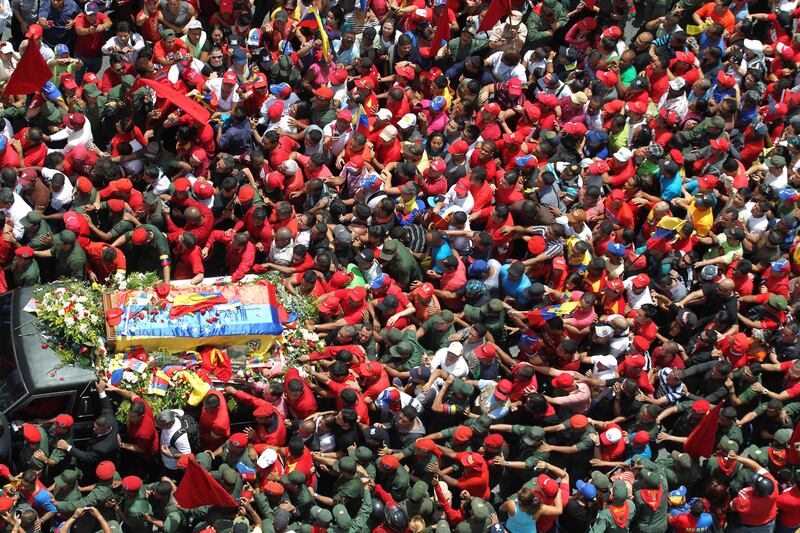It was a farewell fit for a caudillo. Waving flags and wearing bright red berets, tens of thousands of Venezuelans poured into the streets of Caracas Wednesday, hoping to catch a glimpse of the flag-draped coffin bearing the remains of president Hugo Chávez, who died of cancer at age 58 on Tuesday.

More than a farewell, this “sea of red” in the streets was a dramatic display of how completely the leader of the so-called Bolívarian revolution for “21st-century Socialism” has kept Venezuela and much of Latin America in thrall for nearly a generation. As mourners wept and punched the air in grief, the heads of states of a dozen Latin nations flocked to the Venezuelan capital to pay tribute to the mercurial man of the people, whom Brazilian President Dilma Rousseff described as “a great leader, an inspiration, and a great friend.”
The public outpouring was a hint of the anguish still to come as this nation of 28 million comes to grips with the sudden absence of the outsize firebrand who put populism on steroids, made a sport of hectoring the superpowers, and now stands shoulder to shoulder with Latin icons like Cuba’s Fidel Castro and Argentina’s Juan Domingo Perón. “Chávez didn’t die. Chávez lives on in the people,” chanted the mourners in the funeral cortege, bringing downtown Caracas to a halt.
Beyond the commotion, uncertainty and apprehension loom. According to the Venezuelan Constitution—a document often quoted, but rarely followed—a new election must be called within 30 days. Already, pretenders to Chávez’s seat are jockeying for advantage. Pollsters tout the advantage of acting president Nicolás Maduro, who was Chávez’s handpicked heir and looks best placed to ride the wave of sympathy into the Palacio de Miraflores. The most likely challenger is Henrique Capriles Radonski, a 40-year-old governor who galvanized the fractured political opposition to run against Chávez in the October elections, falling a respectable 11 percentage points short of an upset.
And yet what’s clear even now is that no one on the current political stage has the star power, the spin, or the Machiavellian bag of tricks of the late enchanter in chief. “The problem is,” says Diego Arria, a former Venezuelan ambassador to the United Nations, speaking of the field of contenders, “none of these guys is Chávez.”
Just how Chávez parlayed charisma into clout and kept Venezuela’s splintered political interests from flying apart is a subject for the next generation of pundits. One prominent Venezuelan media executive, who understandably asked not to be identified, chalked it up to the innate charm of the man Venezuelans knew emblematically as El Comandante, a talent oiled by an elaborate spoils system to keep insiders fat and happy.
Still others point to Chávez’s skill in fashioning electoral majorities into a political steamroller, squeezing opponents and allies alike in a single-minded campaign to gather power in his own hands. Along the way he might have shredded the Constitution, intimidated critics, put amigos in judge’s robes, and brazenly gerrymandered every election to empower Chávista-friendly voting districts. But all was explained, and widely forgiven, by the greater goal of furthering a bracing if ill-defined revolution in the name of the all-duty Latin American liberator, Simon Bolivar.
Chávez was a master at keeping his allies and potential rivals off balance and compliant. Often he would lambaste aides in public, occasionally firing underperforming “Bolígarchs” before a live audience on his Sunday talkathon, Aló Presidente. Gluing all this together was a reported nexus of bribe taking in which the inner circle of the Chávistocracy was said to skim commissions from opaque federal budgets.
Chávez’s spell extended to fellow Latin presidents. One of the ironies of Chávez’s rise is that he consolidated his authoritarian rule just as open multiparty democracy was remaking the Americas. And yet Latin America’s new democratic leaders rarely spoke against the excesses of Chávismo, turning a blind eye when he canceled the operating license of independent broadcaster RCTV in 2007, ordered prosecutors in 2010 to jail a judge who had pardoned an unfriendly business executive (they did), and in a pen stroke increased the size of the Supreme Court to include more Chávistas.
By contrast, when the Paraguayan congress voted last year to depose President Fernando Lugo in a lightning impeachment, Latin leaders deplored the “breach of democracy” and promptly suspended Paraguay from South American trade bloc Mercosur. Yet the same trade group glossed over Chávez’s own trampling of democratic liberties to unanimously admit Venezuela to the fold, even though Venezuela has failed to ratify Mercosur’s basic ground rules.
To ordinary Venezuelans, this was all so much fine print. They practically worshiped and repeatedly voted for Chávez as Robin Hood in Army boots, an avenger who rose from a humble background to champion the poor and wrest the resources of their oil-rich land from the traditional predatory elite of the moneyed and powerful. They applauded when he purged the state oil major, PDVSA, replacing thousands of oil experts with political cadres and loyal Chávistas, and decanted profits to dozens of missions—social programs for the poor majority.
No matter that the so-called Misiones for slum improvement, literacy, and free health care were pocked with waste and badly managed. The repeated squatter invasions of abandoned buildings and office towers in Caracas are shabby testimony to the government’s dismal record of public-housing construction. And yet Chávez’s was unequaled in spinning failure into promise.
Maintaining the magic will be a harder task. In fact, the succession battle to replace Chávez may be the least of Venezuela's worries. After 14 erratic years of Chávismo, which blended checkbook populism with personal fiat and intimidation of critics and rivals, this oil-rich South American nation has hit a wall. Warning signs are everywhere.
Venezuela’s external debt reached $108 billion last year, some 192 percent above the figure for 2008. Public spending has exploded, rising 26 percent above inflation in 2012, ahead of the Oct. 7 presidential contest that saw Chávez elected for a third term. With new elections in the making, and Chávismo maneuvring to hold on to power, fiscal responsibility is the last thing on the agenda at Miraflores Palace.
Under Chávez, inflation skyrocketed, and it is on track to reach 33 percent this year, one of the worst rates in the world. Even after sharply devaluing the Venezuelan currency, the government has been powerless to stop the black market, where a dollar recently fetched 23 bolivars on the street—four times the official rate. With the local market on life support, capital flight has spiked, jumping from $61 bilion in 2008 to a record $156 billion today, says Goldman Sachs.
What’s worse, Venezuela is sinking at the same time much of the rest of Latin America is beginning to prosper again thanks to tailwinds from the recovering global economy. “Most of Latin America is poised to grow again,” says Goldman Sachs analyst Alberto Ramos.
Consider Peru, where onetime nationalist firebrand and would be coup maker Ollanta Humala has steered away from the Bolívarian sand trap, embraced fiscal sobriety, and welcomed investment from the same countries Chávez demonized. Peru is on track to grow 6.2 percent his year, according to forecasts by the big Brazilian retail bank Itaú Unibanco. Close on its heels are Colombia and Chile, touted to grow by 5 percent each this year, followed by Mexico (3.5 percent) and Brazil (3 percent), Itaú Unibanco reported.
Venezuela’s woes are a direct result of misgovernment, not misfortune. Despite sitting on one of the world’s largest caches of proven oil, the Venezuelan economy is plagued by waste and scarcity. After Chávez nationalized hundreds of companies, foreign investors have fled. Supermarkets are bereft of everything from milk to toilet paper. Most recently, Venezuelans queued for hours in search of wheat flour. Instead of spending government-subsidized dollars on imported flour, bakers would rather take their greenbacks to the black market, where they can buy four times as many bolivars.
At least part of the blame for this unraveling falls to Chávez’s penchant for raiding the country’s oil bounty to pay for bottomless social programs, which are as grandly hailed as they are poorly managed. Meanwhile, the national oil company, PDVSA, has gone from industry benchmark to a borehole of red ink, pumping half a million barrels less oil today than it did 15 years ago. “The company no longer has enough money to meet its financial obligations and operating expenses, but is expected to import food, build houses, and plant manioc,” says former PDVSA director Gustavo Coronel.
The drag on the national economy is evident. A few economists speak of growth slowing to 2.5 percent this year, while others hint of recession. One of the doubters is Francisco Rodríguez. He should know. The Venezuelan-born economist once ran economic research at the Chávista-dominated National Assembly. Now he reports on Latin America's most accident-prone market for Bank of America Merrill Lynch, where he recently predicted that the Venezuelan economy could shrink by as much as 3.5 percent this year.
If that happens, Rodriguez says, many of the social gains that have been the calling card of the Bolívarian revolution will be threatened. That's a bitter legacy for the leader who promised a 21st-century social revolution and a cautionary tale for Venezuelan leaders for years to come, Chávista or not.
While some optimists speculate that if Maduro, or another Chávista, prevails in the coming political transition, the new regime will be compelled in the name of national unity to be more responsive to the political opposition and open to government critics. That may be wishful thinking.
“Anyone who thinks that Venezuela will now embark on an era of economic reforms and liberalization is deluding themselves,” Walter Molano, head of the investment bank BCP Securities, has predicted. “If anything, the country’s new leadership will become even more radical ... They will move closer into the orbit of traditional friends, such as Cuba, China, and Iran, eschewing anything and anyone who may threaten their grip on power.”
How much of this news will trickle through to Venezuelans is an open question. “If anything the campaign against independent media is going to get worse,” says the CEO of a leading communications group. In its bid to consolidate control, “the government is going to create more scapegoats and continue harassing the press.”






